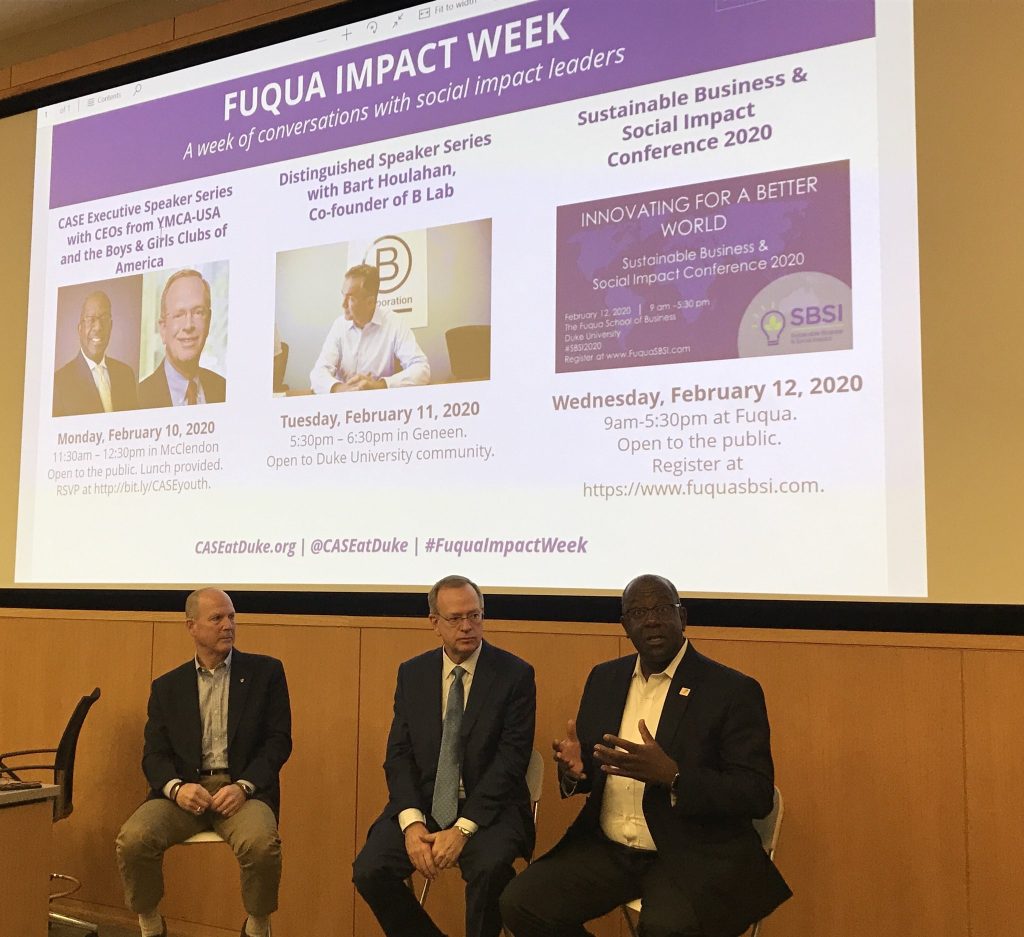
February 2020
On February 10, 2020 Kevin Washington, the President and CEO of YMCA-USA, and Jim Clark, the President and CEO of the Boys and Girls Clubs of America, participated in the Center for the Advancement of Social Entrepreneurship (CASE) Executive Speaker Series at Duke University’s Fuqua School of Business to kick off Fuqua Impact Week. Moderated by Kevin Trapani, Co-Founder and CEO of The Redwoods Group and a CASE Advisory Board member, the two CEOs shared jokes with each other while explaining the ins and outs of their organizations, which, combined, serve 20 million youth a year.
“Working at the Boys and Girls Clubs of America to serve our nation’s youth has been one of the most gratifying and most rewarding experiences of my entire life,” said Clark. “I only have one regret and that is that I wish I would have done it sooner.”
Read below for the top three takeaways from the event:
1. There are benefits and challenges in a federated model
Both the YMCA-USA and the Boys and Girls Clubs of America operate using a federated model. Similar to a franchise, federated enterprises are comprised of local, independent affiliates that must meet and maintain certain requirements to remain members of the parent organization. Both Washington and Clark shared that benefits of the federated model include widespread national impact and the opportunity for locally customized programming and services that best serve the needs of specific neighborhoods and community members. However, as Clark said, within this strength also lies the model’s weakness. Each of the independent affiliates in both organizations have a voice and vote in broader organizational issues. This diffused leadership can slow and complicate the process of making decisions, generating change or addressing failures. Washington highlighted that this challenge is particularly prominent when working to raise the impact and quality of local programs.
2. Talent is one of the most important resources
Although they operate using different revenue models, both the YMCA-USA and the Boys and Girls Clubs of America recognize the value and importance of finding, cultivating and retaining excellent talent at both the staff and volunteer levels. Washington said, “Volunteers are engrained into the community and they are the ones who own the YMCA and nonprofits in the communities, so empowering them not only has served to be an important resource, but has also kept me accountable.” In addition to acknowledging the value of volunteers, Clark added that working in a nonprofit organization is one of the best leadership experiences for preparing anyone in the audience for anything that they want to do next. “We need you, we need you in these roles,” he said. For more information about the importance of talent in generating impact at scale, read People Matter: Evolving Talent to Drive Impact at Scale from our Scaling Pathways series.
3. The growing importance of measuring and quantifying impact
Both the YMCA-USA and the Boys and Girls Clubs of America said that one of their biggest challenges is keeping up with the changing fundraising environment that increasingly requires nonprofits to measure and quantify impact. Formerly, Washington said, donors simply cared about whether the program was “doing good.” Now, he said, funders want to know what type of good and how much good and want a seat at the decision-making table. Clark added that this “microphilanthropy” approach, where donors offer restricted funds to be able to feel and see the local impact of their work, comes with significant management challenges.
To learn more about the CASE Executive Speaker Series and other programming, visit our website. For more conversations with social impact leaders, stay tuned for the second season of our podcast, CASE in Point.

